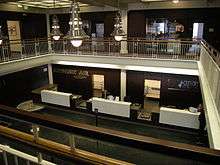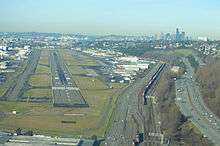Boeing Field
| King County International Airport Boeing Field | |||||||||||||||
|---|---|---|---|---|---|---|---|---|---|---|---|---|---|---|---|
|
USGS 2006 orthophoto | |||||||||||||||
| IATA: BFI – ICAO: KBFI – FAA LID: BFI | |||||||||||||||
| Summary | |||||||||||||||
| Airport type | Public | ||||||||||||||
| Owner/Operator | King County | ||||||||||||||
| Serves | Seattle, Washington | ||||||||||||||
| Location | Seattle / Tukwila, King County, Washington, USA | ||||||||||||||
| Elevation AMSL | 21 ft / 6 m | ||||||||||||||
| Coordinates | 47°31′48″N 122°18′07″W / 47.53000°N 122.30194°WCoordinates: 47°31′48″N 122°18′07″W / 47.53000°N 122.30194°W | ||||||||||||||
| Website | www.kingcounty.gov/... | ||||||||||||||
| Map | |||||||||||||||
 BFI Location of airport in Washington | |||||||||||||||
| Runways | |||||||||||||||
| |||||||||||||||
| Statistics (2011) | |||||||||||||||
| |||||||||||||||


Boeing Field, officially King County International Airport (IATA: BFI, ICAO: KBFI, FAA LID: BFI), is a public airport owned and operated by King County, five miles south of downtown Seattle, Washington.[1] The airport is sometimes referred to as KCIA, but this is not the airport identifier. The airport has some passenger service, but is mostly used by general aviation and cargo. It is named after the founder of Boeing, William E. Boeing.
The airport's property is mostly in Seattle just south of Georgetown, with its southern tip extending into Tukwila. It covers 594 acres (240 ha) and has more than 375,000 operations yearly.
It is in the National Plan of Integrated Airport Systems for 2011–2015, which called it a primary commercial service airport.[2] Federal Aviation Administration records say the airport had 34,597 passenger boardings (enplanements) in calendar year 2008,[3] 35,863 in 2009 and 33,656 in 2010.[4]
History
Except for the World War II period, when it was taken over by the U.S. government, Boeing Field was Seattle's main passenger airport from its construction in 1928 until Seattle-Tacoma International Airport began operations in the late 1940s. The Boeing Company continues to use the field for testing and delivery of its airplanes, and it is still a major regional cargo hub. It is also used by Air Force One when the President of the United States visits the Seattle area.
The August 1946 OAG lists 24 United Airlines weekday departures, 10 weekly flights operated by Northwest Airlines and several Pan Am Douglas DC-3 flights a week to Juneau via a stop at Annette Island Airport which served Ketchikan at the time.
Boeing Field currently has no scheduled passenger jet airline service, The last jet service was operated by Hughes Airwest in 1971 and before that by predecessor air carriers Air West and West Coast Airlines with all three airlines operating DC-9 jets into the airport. A proposal by Southwest Airlines in June 2005 was submitted to King County to relocate from Seattle-Tacoma International Airport to Boeing Field, but was then rejected by King County Executive Ron Sims in October. A similar proposal by Alaska Airlines (which was a response to the Southwest proposal) was also rejected. Southwest Airlines said it wanted to avoid the heavy fees at Sea-Tac due to its expansion program.
The transfer of ownership of Boeing Field from King County to the Port of Seattle was proposed in 2007 as part of a land swap with land owned by the Port.[5]
Facilities and aircraft
Boeing Field/King County International Airport covers 634 acres (257 ha) at an elevation of 21 feet (6 m) above mean sea level. It has two asphalt runways: 13R/31L is 10,000 by 200 feet (3,048 x 61 m) and 13L/31R is 3,710 by 100 feet (1,131 x 30 m).[1]
In 2011 the airport had 227,230 aircraft operations, an average of 622 per day: 69% general aviation, 26% air taxi, 5% scheduled commercial, and <1% military. 427 aircraft were then based at this airport: 56% single-engine, 19% multi-engine, 18% jet, 8% helicopter, 1% military, and <1% glider.[1]
Boeing Company
The Boeing Company has facilities at the airport. Final preparations for delivery of Boeing 737 aircraft after the first test flight are made at Boeing Field.[6] Boeing facilities at the airport have also included a paint hangar[7] and flight test facilities.[8]
The initial assembly of the 737 was at Boeing Field in the 1960s because the factory in Renton was at capacity building the Boeing 707 and Boeing 727. After 271 aircraft, production moved to Renton in late 1970.[9][10] Production of military airborne early warning and control aircraft based on the 737, such as Project Wedgetail (Australia) aircraft and Peace Eagle (Turkey) aircraft is located at Boeing Field.[11]
Museum of Flight
The Museum of Flight is on the southwest corner of the field. Among the aircraft on display there is an ex-British Airways Concorde, lent to the museum from BA, a supersonic commercial aircraft that landed at Boeing Field on its first visit to Seattle on November 15, 1984.[12] Aircraft movement on the airfield can be easily observed from the museum.
-

Boeing Field as seen from the Air Traffic Control Tower
-

Passenger terminal, Boeing Field
Police and fire response
The King County International Airport contracts with the King County Sheriff's Office for police services. Deputies assigned to the airport wear a mix of both Police and Fire uniforms, turnouts etc., which includes single Police, Fire/ARFF patch, and drive King County International Airport Police patrol cars. There are currently 17 patrol officers/sergeants and one chief assigned full-time to the airport. Officers assigned to the airport are also required to obtain a Washington State Fire Fighter One certification and an Emergency Medical Technician certification.
Airlines and destinations
Passenger
| Airlines | Destinations |
|---|---|
| Kenmore Air | Orcas Island, Friday Harbor Seasonal: Lopez Island |
| TCS & Starquest Expeditions operated by TAG Aviation | Seasonal Charter: Anchorage |
Previous airline service
Boeing Field had scheduled passenger flights operated by West Coast Airlines with Douglas DC-9-10 jets, Fairchild F-27 turboprops and Douglas DC-3 prop aircraft to Idaho, Oregon, Washington state, northern California, western Montana, northern Utah and Calgary in Alberta Province. According to the April 28, 1968 West Coast Airlines system timetable, the airline was operating nonstop flights from the airport to Aberdeen, WA/Hoquiam, WA, Boise, ID, Olympia, WA, Pasco, WA, Portland, OR, Salt Lake City, UT, Spokane, WA, Tacoma, WA, Wenatchee, WA and Yakima, WA.[13] The airline was operating DC-9 jets at this time on nonstop flights from Boeing Field to Boise, Pasco, Portland, Salt Lake City, Spokane and Yakima.[14] Direct, no change of plane DC-9 jet service was also operated from the airport to San Francisco, Eugene and Medford, and direct one stop F-27 propjet service was flown to Calgary, Alberta in Canada.
West Coast, which had its headquarters in the Seattle area and operated all of its flights from Boeing Field, merged with Pacific Air Lines and Bonanza Air Lines to form Air West (which was later renamed Hughes Airwest) with these successor air carriers continuing to serve Seattle via Boeing Field with DC-9 jets and F-27 propjets until Hughes Airwest moved all of its flights to Seattle/Tacoma International Airport in 1971.
Aeroamerica, an airline based at Boeing Field from 1971 to 1982 which operated Boeing 707 and Boeing 720 jetliners, flew nonstop service at one point to Spokane, WA.[15]
Air Oregon, a commuter airline, operated scheduled passenger flights in 1979 from the airport to its hub in Portland, OR (PDX) with Swearingen Metro propjets.[16]
Helijet, a helicopter airline based at Vancouver International Airport in British Columbia, operated scheduled Sikorsky S-76 twin engine helicopter flights to the Victoria Harbour Heliport in British Columbia with direct one stop service to Helijet's Vancouver Harbour Heliport adjacent to downtown Vancouver, B.C. before ceasing flights on the route.
Cargo

See also
Notes
References
![]() This article incorporates public domain material from the Air Force Historical Research Agency website http://www.afhra.af.mil/.
This article incorporates public domain material from the Air Force Historical Research Agency website http://www.afhra.af.mil/.
- 1 2 3 4 FAA Airport Master Record for BFI (Form 5010 PDF). Federal Aviation Administration. Effective November 15, 2012.
- ↑ "2011–2015 NPIAS Report, Appendix A" (PDF). National Plan of Integrated Airport Systems. Federal Aviation Administration. October 4, 2010. Archived from the original (PDF, 2.03 MB) on 2012-09-27.
- ↑ "Enplanements for CY 2008" (PDF, 1.0 MB). CY 2008 Passenger Boarding and All-Cargo Data. Federal Aviation Administration. December 18, 2009.
- ↑ "Enplanements for CY 2010" (PDF, 189 KB). CY 2010 Passenger Boarding and All-Cargo Data. Federal Aviation Administration. October 4, 2011.
- ↑ County, Port, BNSF Announce Signed Memoranda on Land Deal, Port of Seattle, February 26, 2007. Retrieved 2009-02-21.
- ↑ Boeing Commercial Airplanes 737 Manufacturing Site The Boeing Company. Retrieved 2009-02-22.
- ↑ Earthquake Update:Frequently Asked Questions The Boeing Company, March 2, 2001. Retrieved 2009-02-22
- ↑ Boeing Field 1969 The Boeing Company. Retrieved 2009-02-22.
- ↑ Wallace, J. "Boeing delivers its 5,000th 737," Seattle Post-Intelligencer, February 13, 2006. Retrieved 2007-12-18.
- ↑ Gates, Dominic. "Successor to Boeing 737 likely to be built in state." Seattle Times, December 30, 2005. Retrieved 2008-02-10.
- ↑ Boeing Conducts Successful First Flight of Australia's 737 Airborne Early Warning & Control Aircraft The Boeing Company, May 20, 2004. Retrieved 2009-02-22
- ↑ Supersonic Concorde airliner pays its first visit to Seattle on November 15, 1984 Historylink.org. Retrieved 2009-02-22.
- ↑ http://www.departedflights.com, April 28, 1968 West Coast Airlines system timetable
- ↑ http://www.timetableimages.com, April 28, 1968 West Coast Airlines system timetable
- ↑ http://www.aeroamerica.net
- ↑ http://www.departedflights.com, Aug. 5, 1979 Air Oregon route map
External links
| Wikimedia Commons has media related to Boeing Field. |
- King County Department of Transportation: Airport Page
- WSDOT Pilot's Guide: Boeing Field/King County International (PDF 71 kb)
- WSDOT Economic Impacts: Boeing Field/King County Int'l (PDF 437 kb)
- Aerial image as of June 2002 from USGS The National Map
- FAA Airport Diagram (PDF), effective November 10, 2016
- FAA Terminal Procedures for BFI, effective November 10, 2016
- Resources for this airport:
- AirNav airport information for KBFI
- ASN accident history for BFI
- FlightAware airport information and live flight tracker
- NOAA/NWS latest weather observations
- SkyVector aeronautical chart for KBFI
- FAA current BFI delay information
